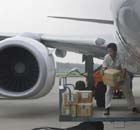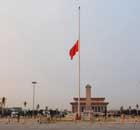World Business
India increases key interest rate
By Cherian Thomas (China Daily)
Updated: 2010-04-21 10:55
 |
Large Medium Small |
Govt takes measure for second time in a month, tells lenders to set aside more reserves to slow inflation
MUMBAI - India's central bank raised interest rates for the second time in a month and ordered lenders to set aside more cash as reserves, seeking to slow the fastest inflation among Group of 20 nations.
The Reserve Bank of India boosted the three policy rates by a quarter point, it said in a statement in Mumbai.
India's one-year interest-rate swap, a gauge of rate expectations, declined the most in a year, and the benchmark stock index climbed after Governor Duvvuri Subbarao refrained from a more aggressive step. Subbarao said that while inflation is worrisome, "supportive liquidity conditions" are needed to help the government sell more debt.
"Monetary policy remains accommodative," said Mridul Saggar, chief economist at Kotak Securities Ltd in Mumbai. "If private consumption and investment demand rises from here it could put manufacturing inflation under stress at a time when global commodity prices are rising."
With Tuesday's increases, the reverse repurchase rate rises to 3.75 percent, the repurchase rate to 5.25 percent and the cash reserve ratio to 6 percent from 5.75 percent.
Policymakers may want to give the government time to complete more debt sales before pushing rates higher, said Ramya Suryanarayanan, an economist at DBS Bank Ltd in Singapore. The government's new bond sales in the year starting April 1 are 36.3 percent higher than the previous year.
"In terms of inflation, it may be better to hike earlier than later," Suryanarayanan said. "The later they hike, the more they will have to hike" to restrain prices, she said.
The Sensitive Index of stocks advanced 0.9 percent to 17,549 as of 1:15 pm in Mumbai. One-year interest-rate swap dropped 12.5 basis points to 4.975 percent, according to data compiled by Bloomberg. Yields on benchmark 10-year Indian government notes fell 4 basis points to 8.04 percent, while the rupee rose 0.4 percent to 44.54 per dollar.
Subbarao estimated India's $1.2 trillion economy, Asia's largest after Japan and China, will expand 8 percent "with an upward bias" in the year ending March 31, according to the statement.
| ||||
"With growth expected to accelerate further in the next year, capacity constraints will reemerge," adding to price pressures, Subbarao said. "There is, therefore, a need to ensure that demand side inflation does not become entrenched."
The action comes after consumer prices paid by industrial workers in India rose 14.9 percent in February from a year earlier. Consumer prices in China rose 2.4 percent in March, less than economists had forecast, even amid evidence of accelerating economic growth.
India's inflation is in part the result of strained infrastructure. The nation produces about 10 percent less electricity than it needs, while roads, which account for 65 percent of the nation's cargo, are plagued by single lanes and irregular surfaces, boosting companies' costs, according to government estimates.
Bloomberg News












